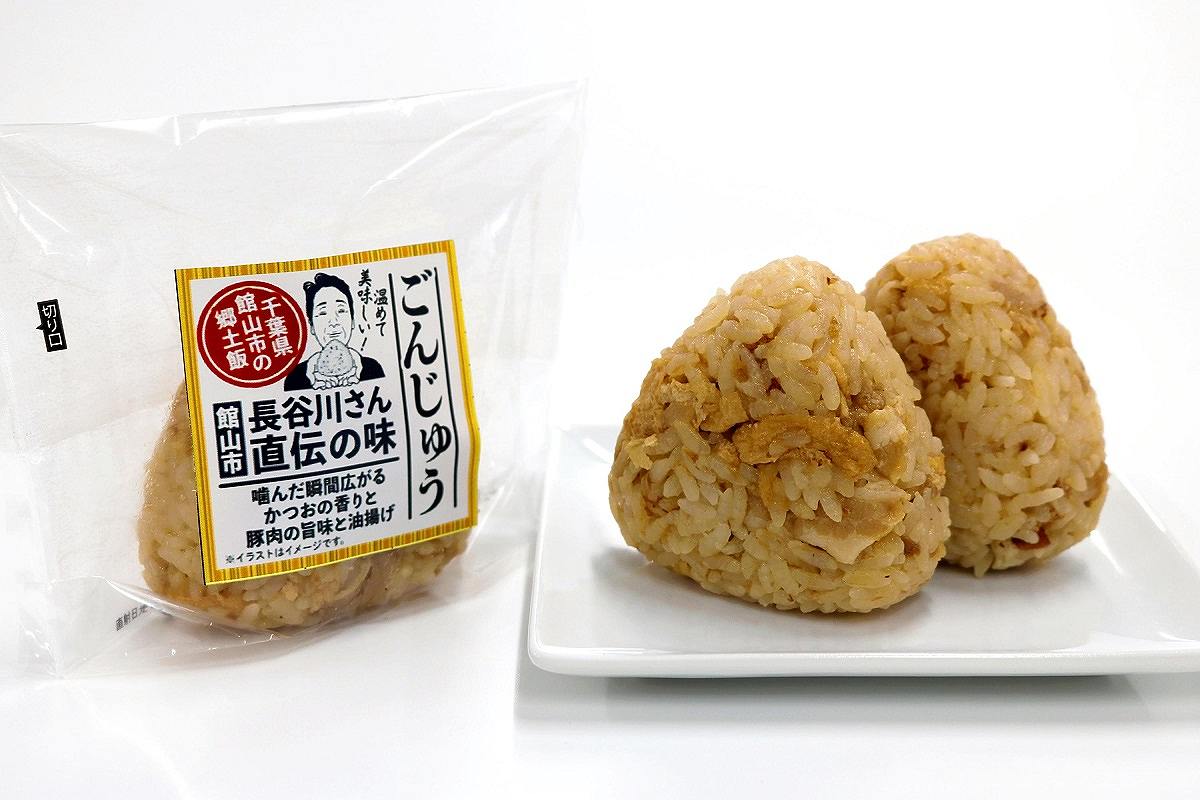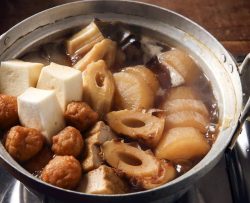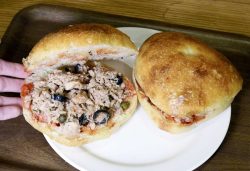Onigiri from Chiba Prefecture Commercially Available; Yokohama Company Begins Selling Gonju in Supermarkets

Mitsuhashi Inc.’s gonju onigiri rice balls
20:00 JST, June 9, 2024
TATEYAMA, Chiba — The city of Tateyama, Chiba Prefecture, is home to a treat known as gonju, an onigiri rice ball packed with ingredients such as sweet and spicy pork, fried tofu and dried bonito flakes.
Now, a major Yokohama-based rice wholesaler, Mitsuhashi Inc., has developed gonju into a commercial product for the mass market. The company began selling it this month, hoping to pass on the taste of local cuisine to the next generation.
The onigiri has been popular in and around Tateyama for many years. But with the shift to nuclear families and the diversification of diets, people are eating it less and less.
The aroma of bonito wafted through the air as I took a bite of the light brown onigiri. The sweet and spicy seasoning whetted my appetite, and the umami from the fried tofu and pork belly complemented the rice nicely.
In the past, gonju was enjoyed all around the southern part of the Boso Peninsula, where Tateyama is located. People supposedly used to eat the rice ball in the 10th month of the lunar calendar, to pray for safety on their way to the Izumo Taisha Grand Shrine in Shimane Prefecture.
The rice balls are still served at the Yawatanmachi festival, a major celebration held in Tateyama’s Tsurugaya Hachimangu shrine.
Gonju is made with ingredients that have been thoroughly cooked, thus preventing food poisoning even during the lingering summer heat.
“Unlike namero [raw fish pounded with miso, and herbs and spices], gonju is rarely offered at restaurants or retail stores,” a Tateyama city official said. “It has been popular as a home-cooked meal since long ago, but I think these days there are fewer and fewer people who know how to make it.”
As for how Mitsuhashi’s focus came to be directed toward gonju: “We were aiming to develop a product that would both increase rice consumption and pass on local cuisine. Gonju was perfect for that purpose,” said employee Atsushi Koyata.
The Tateyama city government introduced Mitsuhashi to Michie Hasegawa, 77, a housewife who lives in the city, to learn the recipe for gonju.
The company had a hard time reproducing the taste of her home cooking, but after about six months of repeated tastings, it managed to produce a commercially viable version of the rice balls in March.
“The appeal of gonju comes from the flavor of the dried bonito flakes and the juiciness of the pork. We have devised ways to better preserve the product without losing its flavor,” Koyata said.
The company plans for gonju to be just the first in a series of local dishes which it will develop commercially.
Koyata emphasized that Mitsuhashi “wants to recreate cuisines from various regions to pass on the flavors of local delicacies to the next generation.”
The company’s gonju onigiri are now available at supermarkets in the Kanto region.
Top Articles in Features
-

Tokyo’s New Record-Breaking Fountain Named ‘Tokyo Aqua Symphony’
-

Sapporo Snow Festival Opens with 210 Snow and Ice Sculptures at 3 Venues in Hokkaido, Features Huge Dogu
-

Tourists Flock to Ice Dome Lodge at Resort in Hokkaido, Japan; Facility Invites Visitors to Sleep on Beds Made of Ice
-

High-Hydration Bread on the Rise, Seeing Increase in Specialty Shops, Recipe Searches
-

Heirs to Kyoto Talent: Craftsman Works to Keep Tradition of ‘Kinran’ Brocade Alive Through Initiatives, New Creations
JN ACCESS RANKING
-

Japan PM Takaichi’s Cabinet Resigns en Masse
-

Japan Institute to Use Domestic Commercial Optical Lattice Clock to Set Japan Standard Time
-

Israeli Ambassador to Japan Speaks about Japan’s Role in the Reconstruction of Gaza
-

Man Infected with Measles Reportedly Dined at Restaurant in Tokyo Station
-

Videos Plagiarized, Reposted with False Subtitles Claiming ‘Ryukyu Belongs to China’; Anti-China False Information Also Posted in Japan






















